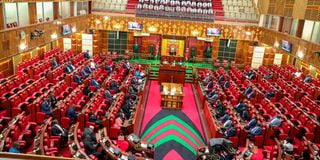
A past sitting at the National Assembly.
A plan by MPs to limit the dominance of foreign firms in local tenders while giving preference to local companies has moved a step closer after the National Assembly approved the legislation.
The Public Procurement and Asset Disposal (Amendment) Bill, sponsored by Molo MP Kimani Kuria, seeks to exclude foreigners from local tenders worth less than Sh1 billion as part of a strategy to promote the growth of local industries and businesses.
It also requires foreign firms seeking contracts worth more than Sh1 billion to form joint ventures with local firms for at least 30 percent of the value of the procurement.
However, the procuring entity must specify the specific goods, works and services to be provided by a local firm under the joint venture procurement.
Advice from the Attorney-General must be sought before such an agreement is ratified, and foreign firms must submit detailed technology, knowledge and skills transfer plans as part of their tender documents.
“The Public Procurement Regulatory Authority will monitor and evaluate the plans to ensure that local capacity is built,” the Bill states. Once passed by the National Assembly, it will be referred to the Senate for assent.
The Bill seeks to amend the Public Procurement and Asset Disposal Act (Cap. 412C) by introducing a wide range of measures aimed at improving the procurement process as well as penalties for those who circumvent the requirements.
Mr Kimani, the chairperson of the Departmental Committee on Finance and National Planning, said the main objective of the Bill was to set a threshold for procurement to be awarded to a local company in order to promote the growth of local industries.
The Bill sets a threshold for procurement to be awarded to local companies, whose shareholding must be wholly Kenyan and incorporated in the country.
It also states that goods and services manufactured in the county must be given priority in the procurement process.
The proposals are seen as a major win for local firms, which have struggled to get funding to compete with foreigners for government contracts.
The foreign companies, for example, have access to cheap loans and advanced technology, giving them an advantage over local firms.
In a bid to prohibit the subcontracting of local procurement contracts to foreign firms, and to give preference to contractors from the respective counties where the project is fully funded by the county government, unless such services are unavailable.
“A successful tenderer who is a citizen contractor, shall not subcontract a foreign company unless the knowledge, skill, good or service is not available in the country,” states the Bill.
“The Authority shall ensure that priority is given to citizen contractors in sub-contracting of tenders that have been allocated to citizen contractors,” it adds.
However, where it is deemed necessary to subcontract a tender to a foreign contractor, the accounting officer shall prepare a report detailing the reasons for the need to subcontract to a foreign contractor and the authority shall ensure that a percentage of the margin preference is applied.
To ensure the sustainable promotion of local industries, the Bill provides for the mandatory procurement of 40 percent of goods and services from local manufacturers or local service providers and empowers the relevant Cabinet Secretary to prescribe the master list for preferential procurement.
The Bill also provides for preferential procurement of local skilled and unskilled labour, and where these are not available, the accounting officer should submit a report to demonstrate their unavailability.
To strengthen accountability, the Bill empowers investigative agencies to probe procurement irregularities even if the related matters are under review by the Public Procurement Review Board.
The Bill provides that a person who registers a company on behalf of a foreigner who engages in unfair competition with a view to benefiting from the procurement commits an offence and is liable on conviction to a fine not exceeding Sh5 million or to imprisonment for a term not exceeding three years, or to both.
In addition, a foreigner who registers a company falsely claiming to be a Kenyan and engages in unfair competition with a view to obtaining a procurement commits an offence and is liable on conviction to a fine not exceeding Sh5 million or to imprisonment for a term not exceeding five years, or to both.
The Bill requires entities to make prompt and timely payments to a contractor who satisfactorily performs the contractual obligations set out in the procurement contract, as a safeguard for contractors whose payments are overdue.
It also provides for strict monitoring and supervision to ensure that the goods and services provided are not substandard.
“A person who certifies or delivers substandard goods or works that are incomplete, non-existent or whose quality is below specifications contained in the contract commits an offence,” the Bill states.
On conviction, the person shall be liable to a fine not exceeding Sh1 million or to imprisonment for a term not less than five years or to both. If the offender is a body corporate, the fine is Sh10 million.
“A person who certifies or delivers substandard goods or works that are incomplete, non-existent or whose quality is below specifications contained in the contract commits an offence,” the Bill adds.
On conviction, the person shall be liable to a fine not exceeding Sh1 million or to imprisonment for a term not less than five years or to both. If the offender is a body corporate, the fine is Sh10 million in addition to a mandatory fine of twice the amount of the benefit or loss.






